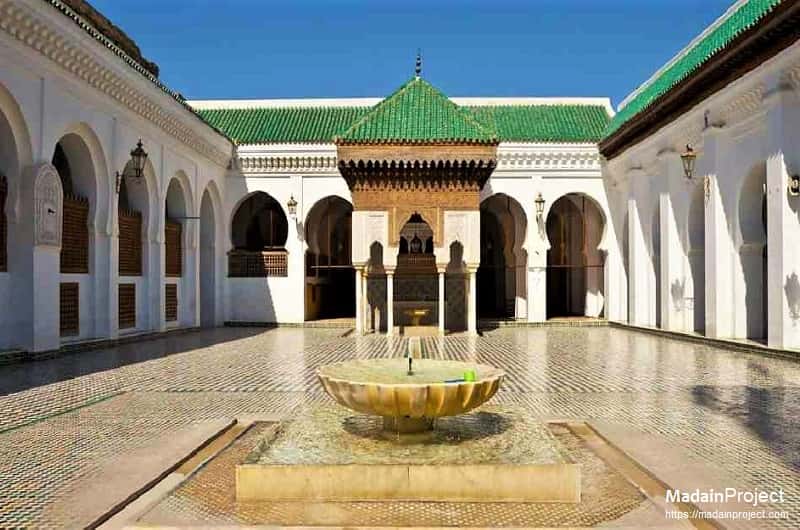ENROLMENTS OPEN: Miftah Program (See here)

The Quiet Pioneer:
How Fatima al-Fihriyya Changed the World


The streets of Fez pulsed with purpose - the clang of blacksmiths shaping molten iron, the rhythmic cry of merchants bartering beneath striped awnings, the scent of bread mingling with desert dust. And above it all, like a thread weaving the city together, the hushed tones of Qur’an recitation spilled from open windows, where sunlit curtains fluttered like pages turning in the wind.
And there, moving through it all under the golden North African sun, quiet, deliberate, walked a woman with eyes full of a different horizon.
Fatima al-Fihriyya.
Once, she had been a girl clutching her father’s hand, her heart full of questions and wonder. But that chapter had closed. Time had refined her with the fire of loss and grief; her beloved father, buried with pieces of her heart. And then came the inheritance; gold, land, status. The world may have called it fortune. But she knew better.
It was a trust. A test. A divine weight.
Fez was changing. Swelling. The city brimmed with newcomers; scholars from Andalusia, traders from the East, families escaping war, seeking hope. Its bones were strong, its walls expanding. But its soul? It hungered. There were masjids, yes, but not enough space for minds to stretch alongside hearts. There were gatherings, but no anchor. No institution that could preserve the knowledge of the past while feeding the seekers of the future.
Fatima walked to an open plain, to where dry earth cracked beneath her feet. She could almost see it: wide courtyards where students could gather, shaded colonnades lined with books, voices rising in respectful debate, prayers floating toward the sky.
Not just for today. Not even for her lifetime.
She wanted to plant something that would outlive her. Something that would stretch far beyond the walls of Fez.
She was not an architect. Not a scholar. Not trained in planning or policy. She had not grown up dreaming of blueprints or lecture halls. And yet, when she stood at the edge of an open plain, a forgotten stretch of dusty earth, she could see it clearly in her mind.
The decision settled into her heart with a weight that felt almost like relief.
A place of worship. A place of learning.
A place where generations would come to seek what the soul and mind both hungered for.
No one had done it before her. No one expected her to.
But Fatima was not afraid to begin what no one had yet dared.
She poured her wealth into the ground like water into parched roots. Brick by brick. Prayer by prayer. She watched something unseen take shape.
And when it was done, it was not merely a masjid.
It was a womb for the intellect. A beacon.
The University of al-Qarawiyyin - the first university in the world - was born from the hands of a woman who saw beyond her time.
Centuries passed.
Empires rose and fell.
And still, her institution stood.
Scholars came from all corners of the Islamic world, from Egypt, Andalus, Timbuktu, Istanbul. The corridors echoed with the sounds of Arabic grammar, Qur’anic tafsir, mathematics, astronomy, jurisprudence. Candles flickered beside open books. The breath of seekers lingered in every stone.
The seekers came, hungry for knowledge, their feet wearing paths through the courtyards she had once walked alone.
Books filled its shelves. Minds lit with the spark of inquiry. And long after Fatima’s footsteps had faded from the earth, the University of al-Qarawiyyin still stood, growing, adapting, surviving centuries of change.
Fatima did not build with the eyes of the world in mind.
She built with her gaze fixed on the One who sees every secret act.
And when Allah accepts a deed, He does not leave it hidden in the dust.
He raises it, He adorns it with honour, and He lets the world drink from its blessing, long after the hands that built it have returned to Him.
She asked for no titles, no praise.
Yet her work became a lantern across centuries.
Because when you plant your dreams for Allah alone, He makes the earth and sky bear witness.
Before Oxford thought of its first halls, before Harvard printed its first diploma, this lone Muslim woman laid the foundations 1,200 years ago of what the world would come to call a university.
One wonders: all these halls of marble and ivy, with their long histories and longer lists of honours - are they not, even now, living in the shade of a woman who once prayed in the dust of Fez?
The one who dared to pioneer.
The one who dared to plant for eternity.
Fatima al-Fihriyya.
What Will You Pioneer?
Download Your Reflection Journal
Take a quiet moment to reflect on the legacy of Fatima al-Fihriyya, founder of the world’s oldest university — and explore what you are building.
What’s inside?
A Reflection Worksheet with thought-provoking questions
A beautifully designed Poster to print and pin up for daily inspiration
Ideal for: Women, girls, educators, and every female seeking to reconnect with Islamic heritage and personal purpose.
The University of al-Qarawiyyin, as it stands today; a living testament to the vision of Fatima al-Fihriyya, whose legacy continues to inspire seekers of knowledge.
Disclaimer: Traces of Her offers a creative interpretation of the lives of Muslim women from the past. Since many aspects of their daily lives are not fully documented, much of the series is based on imagination, inspired by common human experiences, and informed by historical context. The visual depictions and scenarios aim to provide a relatable and engaging setting, helping modern readers connect with and understand our rich heritage. While the scenes are not necessarily historically accurate, they are designed to evoke the essence of what life may have been like, offering a glimpse into the past through the lens of storytelling.
